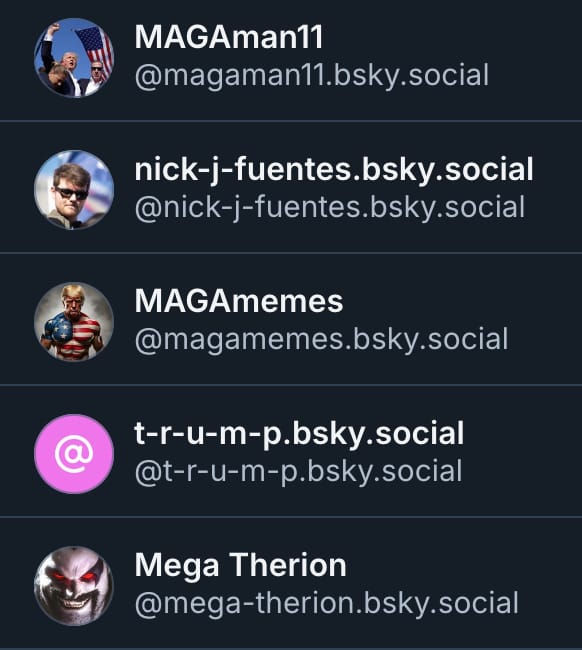The silence of the orcs
Indignity Vol. 4, No. 202

CYBER CULTURE DEP'T.
X Users Come for Bluesky
A WHOLE LOT of creeps and bores showed up on the Bluesky social network over the last week or so. There were also a bunch of famous people and sports fans and other groups that have been underrepresented on Bluesky since it opened to the general public in February, after a long invitation-only beta phase. But the creeps and bores wanted to be noticed.
The original attraction of Bluesky was that it looked and operated like an older version of Twitter, and Elon Musk was in the process of ruining Twitter and turning it into X, so Bluesky offered a way to start over while also doing the same thing. It was tiny, and closed at first, but Twitter/X was getting tinier and more closed all the time, too, only behind the scenes. Musk directly suppressed the sharing of links, and he effectively suppressed discussion by changing the algorithm to boost the contributions of the people who were dumb and backward enough to pay Elon Musk for special-user status, and by unbanning the trolls and racists who posted vile things that Musk personally agreed with.
It would be a stretch to say Twitter was ever a nice or intelligent place, but Musk made it relentlessly nasty and thickheaded, airless and joyless. And then he kept going till he'd made it a Nazi site and an overt arm of the Donald Trump campaign. One of the grimmer aspects of the whole election season was knowing that leading politicians and respectable legacy-organization journalists were still active on X, soaking their brains in posts from users (including Musk) obsessed with racist pseudoscience, the Great Replacement Theory, and anti-trans panic—and believing, somehow, that this didn't distort their perception of the public mood or their sense of social norms.
But between the sight of Musk scampering along on Trump's victory lap and the news that X was changing its terms of service—undoing most of the features of its blocking function and feeding everyone's posts into Musk's AI project—the holdouts finally got the point and started posting on Bluesky. Existing users picked up thousands or tens of thousands of followers in no time at all; celebrities and online-only celebrities appeared in the timeline.
After more than a year of slow, natural-seeming growth, it was a little alarming. Problems of tone and scale that had built up over a decade and a half on Twitter came roaring back all at once, like someone had stuck a stadium PA microphone into an animated bar conversation. A teasing reply to a friend drew some complete stranger to chime in with pure dumb hostility. A mild exchange of conflicting interpretations of events suddenly felt as if it were playing out under hot spotlights. What had been public was now very public.
And along with that came a surge of annoying accounts—writers for brand-name magazines, anonymous trolls on burners, a whole horde of people trained to be irritating online. Replies started to include race-baiting, MAGA taunting, self-righteous frothing about gender, or self-important demands for debate. The most obnoxious reactionaries, Musk's people, were simultaneously pitiable and repulsive: their twin conquests of Twitter and of American politics had done nothing to ease their misery or stop them from desperately trying to inflict misery on someone else. By any objective measure, they had owned the libs, yet the libs owned them.
But Bluesky isn't Twitter, after all. Instead of free speech—in all its incoherent and contradictory forms—the engine of Bluesky is freedom of association. Users share lists of accounts to follow, and lists of accounts to block. And where Musk's version of blocking doesn't even keep the person you've blocked from seeing your posts anymore, Bluesky's block function is complete and comprehensive, wiping out the entire record of an interaction. The person who provokes a block doesn't get a trophy or a signpost to send allies into the fray; the fray itself is gone.
Engineering decisions and norms feed off one another. The dunk-quote, wrapping someone else's post in your own post to mock it, was the fundamental interaction of late-stage Twitter. On Bluesky, the original poster can simply disconnect their post from the mockery. The users themselves, meanwhile, discourage the use of the dunk-quote, on the premise that if someone posts something truly stupid or awful, the most useful response is not to give them attention, but to block it and forget it ever happened.
For people trained on Twitter combat, and annoyed by the earnest and scolding tendencies of the new site, it felt wrong at first. But the new horde of trolls from X, rumbling with their hunger to bait people into making them more visible and more notorious, show why the principle works. The future of engagement is disengagement.
Consider engaging with Indignity on Bluesky.

WEATHER REVIEWS
New York City, November 17, 2024
★★ The back window now looked out on a courtyard gone gold, and short sleeves were tolerable out on the balcony. Translucent white lay in brushstrokes on the sky. The air smelled of burning again. In late afternoon the smoke hung visibly in the streets, a pervasive blurriness. The colors tinting the sky were the exhausted russets of fading leaves. The smoldering reek outside the new dumpling palace by 50th Street was like the winter coal smog outside the new dumpling palace by the Liangma River, nearly two decades before.

EASY LISTENING DEP'T.
HERE IS TODAY'S Indignity Morning Podcast.

Click on this box to find the Indignity Morning Podcast archive.


ADVICE DEP'T.
GOT SOMETHING YOU need to justify to yourself, or to the world at large? Other columnists are here to judge you, but The Sophist is here to tell you why you’re right. Direct your questions to The Sophist, at indignity@indignity.net, and get the answers you want.

SANDWICH RECIPES DEP'T.
WE PRESENT INSTRUCTIONS in aid of the assembly of a sandwich selected from Entertainment Cook Book: Recipes by Students of Central College for Women, Lexington, Missouri, compiled by Lexington Central College Club, Mo. Central College for Women, published in 1919 and available at archive.org for the delectation of all.
COCOANUT SANDWICHES
1 cup cocoanut,
1/2 cup powdered sugar,
Orange juice.
Make a paste of cocoanut, powdered sugar, and orange juice. Spread between slices of brown bread. — Mary Winston Greene, Lexington, Mo.
BOSTON BROWN BREAD
2 1/2 cups whole wheat flour,
1/2 teaspoon salt,
1/4 cup sugar,
1/2 cup molasses,
1/2 teaspoon baking powder,
1 1/2 teaspoons soda,
1 egg,
2 cups buttermilk.
Half fill greased cans, and steam for three hours. —Mrs. Laura B. Lawrence (Daughter of Dr. J. O. Church, Former President), Charleston, Mo.
If you decide to prepare and attempt to enjoy a sandwich inspired by this offering, be sure to send a picture to indignity@indignity.net.









